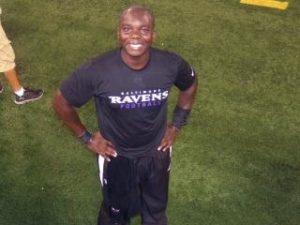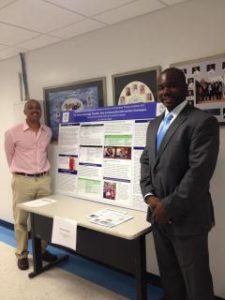
Meet Omololu, who is a stuntman for the Baltimore Ravens, the only team in the NFL with a co-ed stunt team…and the SuperBowl Champs! It’s been a big year for Omololu! He recently completed his Masters of Science in occupational therapy at Howard University in Washington, DC.
How did you get into Occupational Therapy?
As a young child my family encouraged pursuing an educational path in the sciences. Having a close-knit family unit comprised of nurses, doctors, and accountants served as a blueprint to follow. My mother was my biggest support. I began my undergraduate as a pre-med major; I found that I was more interested in political science. However with a strong foundation in the hard sciences, it was easy to transition to occupational therapy after college.
I recently graduated so now I am studying for my board exam. I became interested in occupational therapy because, while in college I worked with a young child with autism at my summer job. I took him to his occupational therapy, physical therapy, and speech language pathology sessions. I found that OT to be the most fun! I chose the profession because it looked like fun. Boy was I in for a surprise when I realized the amount of biology, psychology, anatomy, neuro, and kinesiology you must know in order to be a therapist
Best part of your day job?
Seeing patients go home and return to live independent and meaningful lives.
 So what’s it like to be an occupational therapist?
So what’s it like to be an occupational therapist?
As an occupational therapist I help people get back to doing things they could not do because they are sick or they are born differently. The general flow of an OT’s day depends on the setting, but the general procedures for a therapist day should have this flow. No matter the setting, the day would start with chart reviews, and getting an overview of the patient. Based on a diagnosis an OT can make predictions about the occupational needs of a client and how an OT can help. In order to further assess clients needs, occupational therapists use standardized and non-standardized assessments. For example, if a client had a swollen arm because of an accumulation of fluid, an OT would use a volumeter or circumferential measuring tape to see how large a swollen arm is compared to the non swollen hand. This then allows the OT to make pragmatic and achievable goals for the client.
Which came first, your interest in science or cheerleading?
My love for cheerleading came first. When I cheer I am able to be in the moment and have fun! Also, being a cheerleader comes easy to me. I love gymnastics, and putting in the practice it takes to perform elite level stunts. Science, on the other hand, did not come so easily. I had to work very hard to learn the basics. The fun of science came later.
How do the qualities that make you a great cheerleader benefit you in your science career?
As a cheerleader you cannot be shy. In order to be a successful cheerleader you have to practice your skills on a daily basis, and try your best to be the best cheerleader you can be. The most beneficial part of being a cheerleader was learning, through practice, how to work hard and focus on a goal. Occupational therapy school is not a walk in the park! Long nights are spent in the library, much like the long nights spent at cheer practice.
Have you faced a situation where you had to challenge a stereotype about cheerleaders ?
Stunt men are faced with stereotypes on a daily basis. When people find out I’m an NFL cheerleader they ask…and I quote: “do you wear the skirts and pom poms too?” I am glad to explain to them the role of a male cheerleader in the NFL and how unique the Baltimore Ravens Cheerleading team is. I would say I love to break down stereotypes. I just live my life the fullest. I love what I do and I love who I am. If I’m breaking down a stereotype then so be it.
If you could rewind the clock and change your degree, would you? If so, to what and why? If not, why not?
I would never change my degree. Being an Occupational Therapist is my calling. It is hard to explain. But I feel like this is what I was meant to do. Help people and have a smile on my face while doing it!
What advice would you give your 12-year-old self?
I would tell my 12 year old self to become a cheerleader sooner. I don’t regret anything in my past, but I would have liked to start cheerleading at a young age.
Apart from work and cheering, what are some of your favorite activities?
My most favorite past time of all time is EATING. I love trying out new restaurants, and new meals. I am not a picky eater and I will try anything exotic. I wish I had time to read more books, but with school and Ravens I only have time for text books and practice exams. My favorite TV show is Downton Abbey.
Why do you want to be a Science Cheerleader?
I think it is important to lead through doing. Actions speak louder than words. If a young African American or African male sees me doing what I love and is interested in science (or being a stuntman), perhaps he can feel as though he can do it too.

